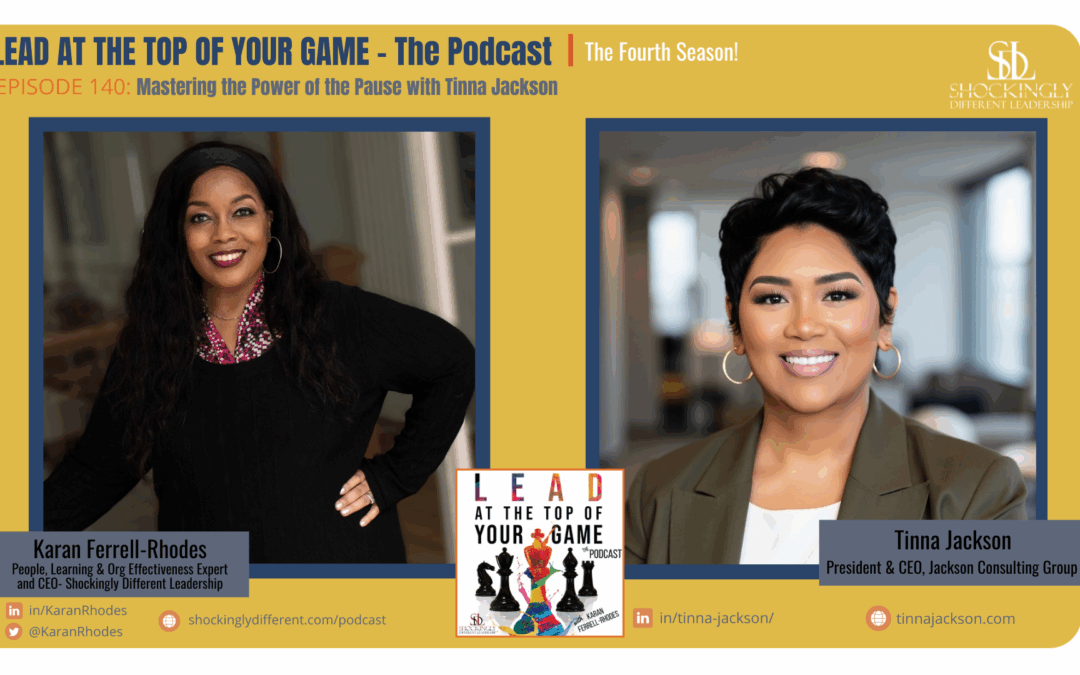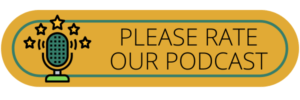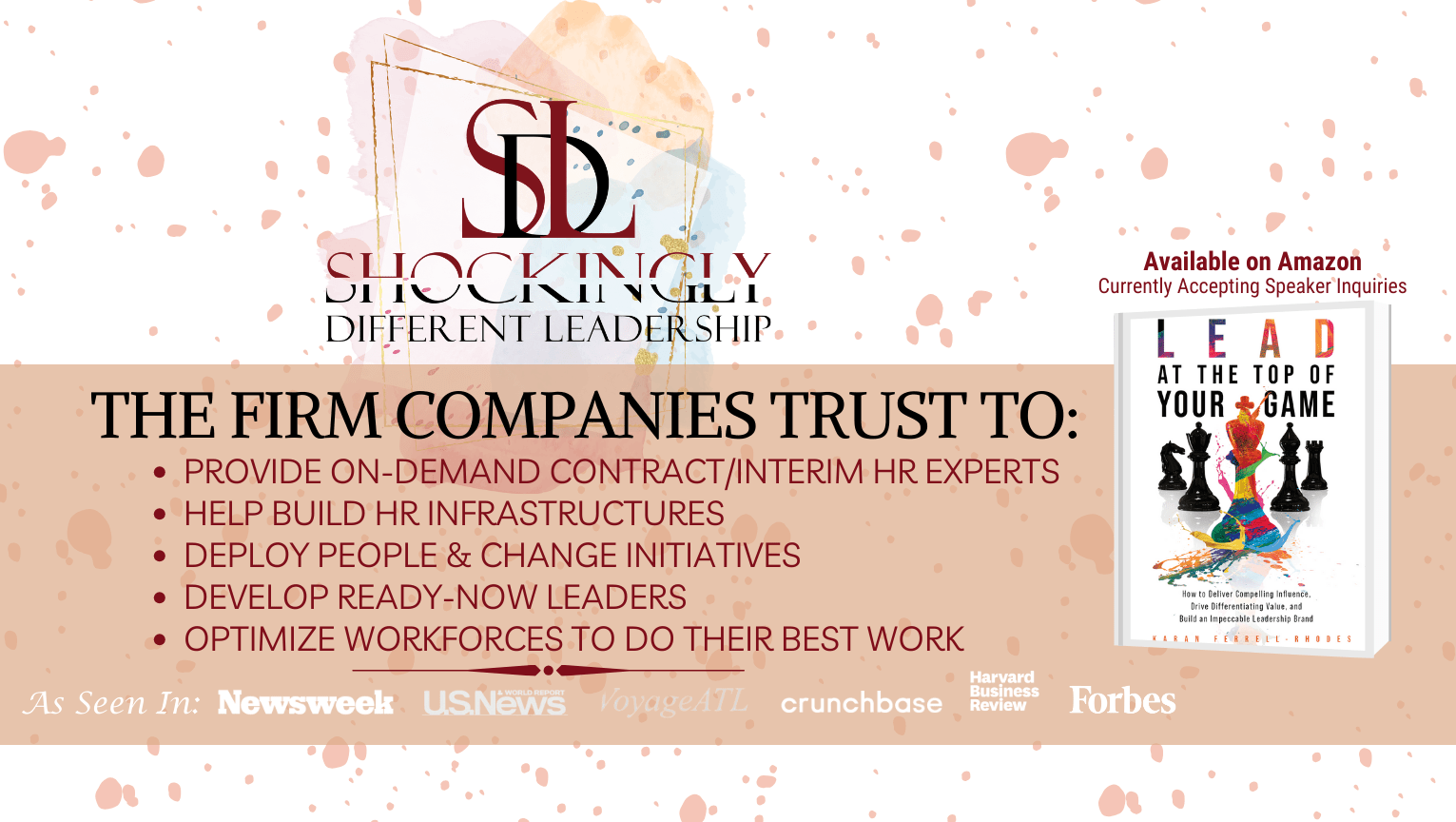IN THIS EPISODE, KARAN FERRELL-RHODES INTERVIEWS TINNA JACKSON.
Tinna shares her journey from Capitol Hill to executive coaching, focusing on building leadership skills through self-awareness, resilience, and the power of taking intentional pauses. She offers advice on recognizing team needs, managing burnout, and aligning personal values with professional achievement.
Tinna Jackson is the President and CEO of Jackson Consulting Group. Her company provides executive coaching and leadership consulting services to professionals and organizations seeking to enhance management effectiveness and cultivate a positive workplace culture. The firm specializes in helping leaders close the gap between technical performance and true leadership impact.
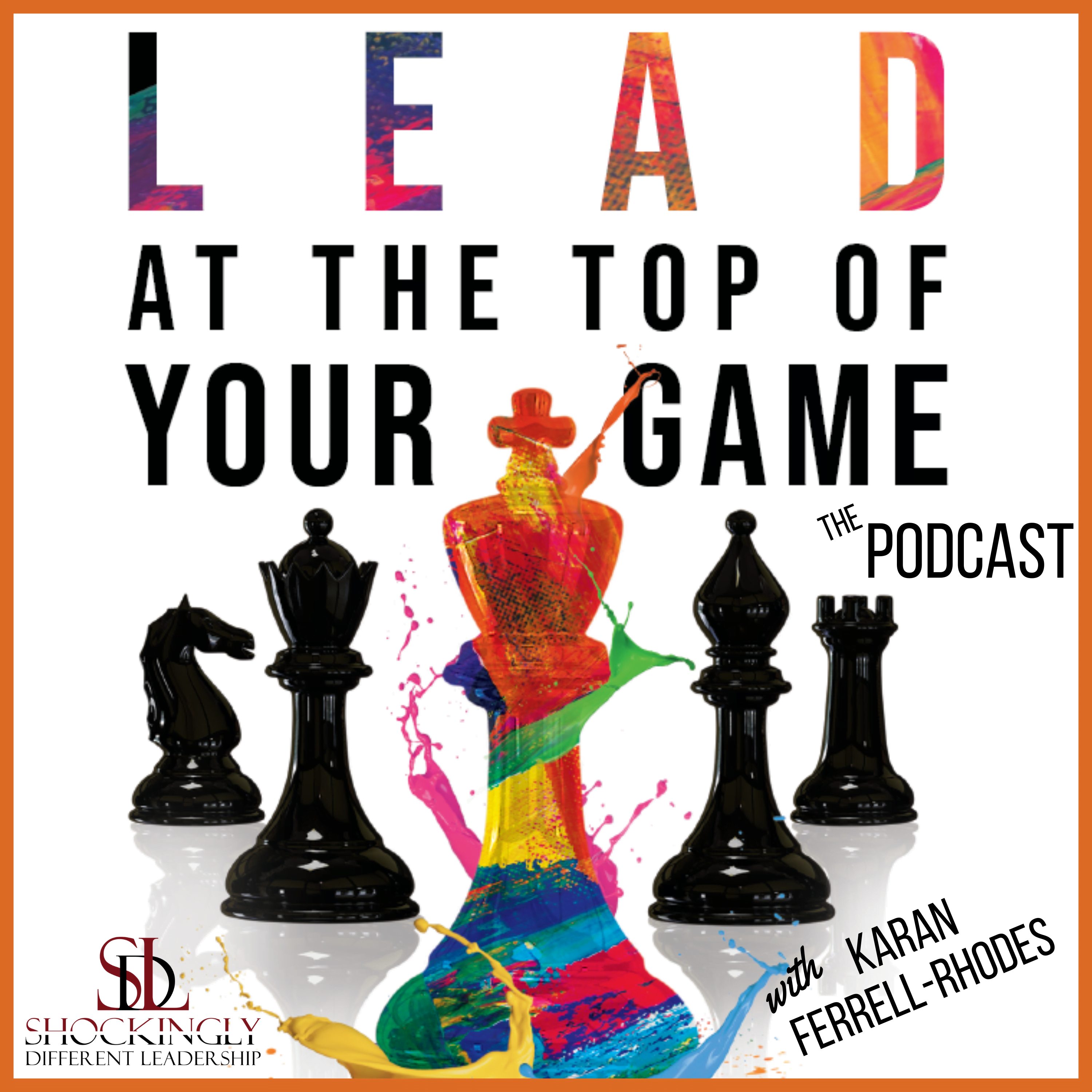
Posted by
SDL Media Team
Rather view our video podcast?

WHAT TO LISTEN FOR:
- Tinna’s unique path from Capitol Hill to executive coach and author
- The “power of the pause” and ways leaders can avoid burnout
- Strategies Tinna recommends for leaders to better support their teams during difficult times
- Personal story about resilience and handling professional responsibilities after loss
- Suggestions for leaders on aligning personal values with professional roles
- Practical tips on reading nonverbal cues and fostering open team communication
- The role of executive presence in effective leadership, according to Tinna
- Impact of the Jackson Consulting Group on bridging the gap between top performers and effective leaders
“The work that you are doing is in exchange for pay.”
FEATURED TIMESTAMPS:
[00:36] Introduction of Tinna and highlights of her leadership background
[02:40] Personal life and sports interests shared by Tinna
[03:58] Professional journey from creative pursuits to Capitol Hill and founding Jackson Consulting Group
[06:49] Challenges transitioning from structured employment to entrepreneurship
[09:11] Emotional intelligence and the genesis of “The Power Play Journal”
[13:57] The “power of the pause” and lessons on managing burnout
[16:18] Importance of leaders noticing nonverbal cues and team well-being
[19:58] Signature Segment: Tinna’s entry into the LATTOYG Playbook: Leaders must notice nonverbal cues and seek feedback to be truly self-aware.
[22:59] Balancing ambition with personal alignment for high performers
[26:09] Advice for individuals planning a career pivot or transition
[31:26] Signature Segment: Tinna’s LATTOYG Tactic of Choice: Leading with Executive Presence
[33:43] Connect with Tinna

ABOUT TINNA JACKSON:
Tinna Jackson is a nationally recognized executive strategist, bestselling author of The Power Play Journal, and award-winning coach named Top Executive Coach & Management Consultant of the Decade (2025) by IAOTP. With over 25 years of experience at the intersection of power, politics, and performance, she helps leaders navigate high-stakes environments with clarity, confidence, and influence.
A former Deputy Chief of Staff in the U.S. Senate, Tinna is the Founder and CEO of Jackson Consulting Group and PowerDyn LLC. Her work has earned honors from Forbes Coaches Council, Influence Digest, Women We Admire, and the Axiom Business Book Awards.
LINKS FOR TINNA
-
Website: tinnajackson.com
-
Facebook: https://www.facebook.com/coachtinnaj
-
Instagram: https://www.instagram.com/iamtinnajackson/#
ADDITIONAL RESOURCES FOR YOU:


Episode Sponsor
SDL is the go-to firm companies trust when needing to:
- supplement their in-house HR teams with contract or interim HR experts
- implement leadership development programs that demonstrate an immediate ROI and impact on the business

Episode 140 | Mastering the Power of the Pause with Tinna Jackson
Tinna Jackson 00:03
I realized, and you know this, having a background in HR, a lot of times people are promoted for different reasons, right? Right matter expertise, not that they’re actually good at managing people, not that they can motivate a team, but they might be good at this one particular thing. We’ll give them a shot and hope for the best, right? Um And, and I realized there was a gap between good employee performance and effective leadership, and what that effective leadership could look like.
Voiceover 00:03
Welcome to the “Lead at the Top of Your Game” podcast, where we equip you to more effectively lead your seat at any employer, business, or industry in which you choose to play. Each week, we help you sharpen your leadership acumen by cracking open the playbooks of dynamic leaders who are doing big things in their professional endeavors. And now, your host, leadership tactics, and organizational development expert, Karan Ferrell-Rhodes.
Karan Rhodes 00:36
Hello again, my superstars. This is Karan, and welcome to another episode of the lead at the top of your game podcast. On today’s episode, we have a tremendous leader in her own right. We were, I was teasing her before we came on, that I already know we’re going to probably run out of time as we do. As you all know, I’m a chatterbox, but she has such a dynamic background and perspective that I cannot wait to delve into on leadership and other things as well. I’m so pleased to introduce you to miss Tinna Jackson, who is the president and CEO of the Jackson Consulting Group, and her the Jackson Consulting Group is a nationally recognized organization, and she is an executive strategist, as well as the best selling author of The Power Play journal. She’s also an award winning coach, and was named the top executive coaching management consultant of the decade, believe it or not, by the I, a, o, t, p, and another fun fact about her is that she was a former deputy chief of staff in the US Senate, and looks like we could, they could definitely use some of her leadership expertise right now, but we’re going to stay out of politics because we have a lot of other things to talk about. But welcome to the show. Tinna,
Tinna Jackson 02:02
Thank you so much for having me. This is awesome.
Karan Rhodes 02:06
It is tremendous to to have you. And like I said, I cannot wait to delve into a ton of topics, including your book, some of your coaching, and a lot of other things that we have queued up, but before we do so, we always love to learn just a tad bit more about our guests. So for just as much as your feel comfortable, would you mind giving us a sneak peek into your life outside of work?
Tinna Jackson 02:33
Absolutely. Well, I am actually born and raised in Washington, DC. There’s only like two of us around, but, but but, yeah, it’s just me and my husband. We spend a lot of time, you know, during football season, going to every football game the Washington commanders, and during basketball season, going to see the Washington Wizards. And we also support other, you know, local teams, the local colleges and universities here too. So we’re big sports buffs.
Karan Rhodes 03:01
Okay, so we have that in common. My listeners do know I am an Atlanta sports fanatic, long suffering, Atlanta sports fanatic, but the Falcons, Braves, the five strikes with the soccer team and then, of course, local colleges. I’m a UGA grad, so definitely behind my Bulldogs, but then I, you know, support our HBCU teams and everything, so we definitely have that in common. Awesome. All right. Well, let’s just delve right in. If you don’t mind, we could start so many areas. But what I would love for you to do, if you don’t mind, is, can you start by giving us just a few highlights of your professional career thus far, and then how it brought you to starting the Jackson Consulting Group?
Tinna Jackson 03:58
Yeah, absolutely. You know, interestingly enough, initially, I had no interest in going the professional route in terms of working in a professional environment. I’ve always been a creative person. I literally went to cosmetology school. And my plan, you know, I worked in a law firm during the day and at night. I went to cosmetology school because I was going to do runway work, I was going to do hair and makeup and do your New York Fashion Week. And then at the law firm, I ended up working for multiple partners, which then led to one partner taking an interest in me and recommending that I follow them and go with them to Capitol Hill once a particular member got elected, and I just, I was just resisting. I didn’t want to do it. I’m like, I don’t respect politicians. But he kept asking and kept asking. And I met the person, and I said to myself, maybe you’re being called to serve. If maybe this is what you’re supposed to be doing. And I and I took it, and 10 years later, was in the Senate for in the Senate for 10 years after that, I did some work in social justice nonprofit, and then I got the political bug again and started working for a political committee. What led me to going into my own business, full time with Jackson Consulting Group, was I realized, and you know this, having a background in HR, a lot of times people are promoted for different reasons, right? Right matter expertise, not that they’re actually good at managing people, not that they can motivate a team, but they might be good at this one particular thing. We’ll give them a shot and hope for the best, right? Um And, and I realized there was a gap between good employee performance and effective leadership, and what that effective leadership could look like, and and I had several friends that were leaving and, you know, taking big C level jobs. And you know, whether they were qualified for those jobs is another story. But there were gaps, and I figured with Jackson Consulting Group, I could help fill those gaps as much as I could, particularly in this town, in DC,
Karan Rhodes 06:23
Absolutely, I’m sure there’s, there’s plenty of opportunity everywhere. But, you know, being in a knowing about the political environment, I’m sure you there’s a lot that you brought to the table that could help them and closing those those gaps. And that’s, that’s awesome. And how has it been so far moving from, I guess, a structured position into consulting?
Tinna Jackson 06:48
I think it was, it was it was an it was an interesting transition at first, because my work ethic didn’t shift in that, you know, even my husband was like, do you have to check with your boss before you take a vacation? Right? Oh, I am the boss. Let me, that’s right. Chill out. Let me. Let me restructure this. Let me actually take a look at my workload that I have created because I’ve brought these clients on, and so I’ve had to think about, you know, what running a business actually looks like, you know, not being the chief. Someone that I met over the weekend talked about chief everything officer. You can’t do that when you are trying to do business development, bring in clients and also service those clients, you can’t do all of those other things. It’s just impossible,
Karan Rhodes 07:46
Right, right? And I will say that too. And I my listeners. You know, my last main corporate gig before I started my consulting firm was I worked almost 14 years for Microsoft and a variety of roles and under the HR and organizational change and development umbrella, but multiple roles, and it is a transition that you you know you, and as much planning as you do until you’re walking in those shoes, you know you. You’re not quite sure how to regulate yourself, but you do learn it very quickly. I always say, you know, here we are, 10 years later in the in the likes are still on, and we’re just doing great. So it has been extremely rewarding to be able to do that so but I just want to wish you congratulations for making that courageous leap as well.
Tinna Jackson 08:38
Thank you so much Absolutely.
Karan Rhodes 08:41
Well, let’s get now switch gears and talk about your best selling the power play journal would love for you to share with the listeners a bit more about what’s what’s it all about, and maybe a couple of points that you or teasers that you would like to share with us, of lessons that you’re getting across to your readers.
Tinna Jackson 09:10
Absolutely. Thank you. You know, going back to you know, the experience of recognizing that some people are promoted for different reasons, what I what I wanted to do with this book was to get people to reflect on why they’re functioning the way they’re functioning. Right? The book is basically, it’s based on, you know, emotional intelligence, concepts, right? Self regulation, self awareness is key. And what I wanted to do with this book is introduce 32 strategies, battle tested strategies for for leadership and impact, and just remind people that we need to be checking ourselves when it comes to strategic planning, building a legacy. Um, authentic leadership. You know, resilient leadership, just like the first chapter is on resilient leadership. And I tell a personal story where I lost two brothers back to back during covid, but I also had a very important job that I had to I had to tell myself, or ask myself, you know, when are you going to go back to work? And all I could hear were my brothers, who were very tough guys, telling me, like, don’t sit around crying over me right work, like, go back to work and but, but in doing that, I made sure that I made space for myself. If I was feeling bad or, you know, thinking about my brothers, I would give myself that space. And I made sure that the people I was working with understood that that space was needed, and people were very respectful. They were actually surprised that I had returned to work so quickly, but I did give myself that space, and I honored that every step of the way.
Karan Rhodes 11:06
You know, there’s a lesson for all there, especially the people leaders out there. It was fantastic that you carved out that space for yourself, but there’s some work environments that may not have been as flexible for that and for the people, leaders and executives out there, when your employees are going through something major, please do all that you can to give them some air cover To be able to tackle that, because they will they will not only appreciate it, but their trust and loyalty, and for you and the company, will will quadruple, and I’ll share very quickly my own story. It wasn’t during covid. I mean, I did lose some, a few family members during covid, but I when I was at Microsoft, I became the primary caregiver for both my mother and grandmother simultaneously. They had their own medical situations they were working through. And I still remember, and I’m still grateful to this day my boss giving me the time that I needed when I needed, you know, time off. I mean, you know, we had some help come in, but time off, as long as I was able to get, you know, the core functions of my position done. She was so, so flexible, and I’m still, you know, here it is. You know, 10 years later, I am still so thankful for that space and grace that was given to me, and it wasn’t just a boss, it was, it was also the culture of the company to do so as well. But, you know, I will never have anything bad to say about my experience, and so I just wanted to share that, that story with you as well.
Tinna Jackson 12:56
Yeah, and you know, that’s where, that’s where empathy comes in, right? Put yourself, you know, as a leader, put yourself in the employee’s shoes when they’re experiencing a loss. It is not different when it’s happening to you. Yes, exactly, you know. And I think people, I think people forget that when they become, you know, leaders at the top of this food chain. I really do. I think they forget.
Karan Rhodes 13:20
Yeah, I think so too. And I don’t know where, where or how that happens, but they do, and I’ve seen it many, many times, and had to be tactful and reminding them of, you know, some other things they should keep in consideration during those types of times. Yeah, you have a powerful phrase that that you amplify in all your work, and it’s called the power of the pause. It’s kind of similar to what your experience that you mentioned, but it’s a deeper meaning behind that, and I would love to give you an opportunity to share with the listeners about that.
Tinna Jackson 13:57
Yeah, I think, you know, particularly as women, I think we do a lot, and we are capable of taking on a lot. We even solve problems that no one has asked us to solve. We are it’s easy for us to see the forest through the trees. We know exactly how to fix the problem, whether it’s in the workplace or at home. That’s right. And after a while, you get tired, and you realize, unbeknownst to you, that it’s starting to look like burnout. It’s starting to look like headaches. It’s starting to look like you can’t like you’re falling asleep earlier than normal. You know, it looks like you don’t feel like cooking, or you don’t even feel like eating. And, you know, I say the power of the pause, because it’s, first of all, it’s okay to stop. It is okay to recognize that I might be doing a little too much. Yeah, and it’s okay to pause and be selfish. Like, look at yourself. Look at what you’re doing. Look at all, look at all that you’re pouring out and you’re not receiving in return. It is okay to stop, to pause and evaluate what you’ve been doing and what you might consider doing differently, and really looking at what support might look like for you and asking for that support.
Karan Rhodes 15:25
Oh, I love that absolutely. But we’re not really taught to do that once you leave college, right? Once you get into the business world, you know, I can’t think of anyone or any conversation where we were talking about pausing, asking questions, taking things off one’s plate, if things are putting on, we’re so good about accepting other duties as assigned, but not asking, if we do that, what can Be de prioritized for the moment so that we can keep some kind of work life well being. We’re never taught to do that. And I love your empowerment message, to take it upon yourself and pause and and see and regroup.
Tinna Jackson 16:18
And you know, I think I think as leaders, too. I think we need to recognize the signs, yes, when someone might be overloaded, overextended or flailing. I’ll tell you a quick story. I was with one organization, and you know, I would do rounds. You know, you’re walking around, talking with folks just doing quick check ins. And I remember a young lady who, first day she walked in, her hair was long, just beautiful and healthy. And I know this because remember I went to cosmetology school, yeah. So a couple months later, I noticed her hair was shorter, like brittle, like, breaking off, like, and I went to her supervisor, and I said, Hey, have you noticed anything about she looks different? Looks a little weary. You know, she’s lost some hair. It’s like, No, I don’t know what you’re talking about. I was like, You need to check on her. Yeah, what is going on? But I just dismissed it. And I went directly to the to the young lady, and I said, Hey, you look different. Is everything okay? Like, your hair is different. She’s like, Oh, my God, I’m just so this is this job is too much. I said, okay, it’s okay to say something. It is okay to say something. I said, I would recommend that during the next check in with your boss that you you know, just talk about your workload and ask if things can be like reprioritized or something. But it’s important to take that step. It’s okay to speak up and say, you know that you need help. That’s right, that’s but, but I couldn’t believe that, like when I went to the supervisor, like they just never noticed. You see this person every single day. They are a senior member of your team, and you didn’t notice that someone’s hair goes from literally the middle of their back to, like, close to the ear. And I’m like, that’s not a haircut, no. And even if it was a haircut, you probably would have noticed and either complimented or just at least noticed, yea.
Karan Rhodes 18:35
Right? Yeah, you should, you should always be on the notice. Be on the alert, especially for your you know, the your people, they’re only as, I guess, strong and impactful, as confident as they feel, if that makes sense. And you brought up a good point, and I’d love to do one of the things we love to do on the podcast is to give our listeners just a couple of tips or two just to keep in their hip pocket that they can use for day on day one, and you started with this previous story about the young lady that you observed. Are there maybe one or two more tips that you can give leaders on how to say closer to their teams, or be more aware about the needs of their teams.
Tinna Jackson 19:29
I think it’s important for leaders to recognize what’s not being said. Non verbal cues, I think are very important. People shake their heads Yes, and they mean no all the time, just in facial expressions, just in the blink of an eye. That’s right. And I think it’s important to notice those things. You know? The other tip I have is just knowing that. Who you are as a leader, being more self aware, because I think as leaders, we need more feedback from the people we work with and from our peers. It is startling to find out you are not the person that you’re trying to project, and people see you differently. It is, I can’t tell you how many people are walking around thinking they’re great leaders and they are terrible.
Karan Rhodes 20:26
I know, oh my goodness. And you see it a lot of especially in the consulting world, because, for some reason, they let their guard down a little. I’ve noticed leaders let their executives let their guard down a little bit more when you’re a consultant versus when you’re, you know, maybe an HR leader or fellow colleague, because you want to have that, you know, perception of I’ve got this all solved. I can do it, but I’ve noticed, when I consult with them, especially one on one, you really, truly find out how not self aware. A lot of people are, and to your point, when they come to that realization, whether it be via feedback on 360s or behaviors that you as a coach, point out, they are quite startled. And some take it well, and some take it not so well, to be honest with you, when that enlightenment comes to them. So
Tinna Jackson 21:31
It’s alarming. It is. It’s scary that someone goes through life. Let’s say you’re in your 40s, and you’re you make it to a VP or C level position, and no one’s ever told you that you know you don’t receive feedback well, or you think you’re patient, but you don’t. You say you’re patient, but you don’t behave as a patient leader. And what does that and what does that look like? What do you think a patient leader looks like? Because what you’re exhibiting is not patience
Karan Rhodes 22:03
Right! Exactly You’re so right. Also, you know, one of the things that a lot of leaders, including myself, have always considered themselves when we talk about kind of self reflection is considered themselves as a high achiever. I know, throughout my corporate career, you know, been on almost everybody’s quote unquote high potential list or higher performer list. I’ve been on succession slates and all that. But I’ve always wanted to, I had that just inner value to show up as my best and try to do what I can to help support the company and others and the teammates. And I’m just curious if you had thoughts on how high performing leaders can learn to separate their ambition from also personal alignment.
Tinna Jackson 22:59
Yeah, it’s tough. I think it depends on where your focus truly is. I think when we are within an organizational structure, we are working hard for the organization either because we believe in the culture, we believe in the organization and the mission, and we want to make sure we are achieving that mission, and that we are looking good in the process, right? And that might mean, you know, making making sure that you are responsive after 5pm or that you are over doing it on a project. You’re over constantly over delivering. However, when it comes to personal alignment, that’s a bigger piece, that’s that’s and that’s a level of energy, that’s a level of knowledge that is, that’s a level of purpose that you have to become familiar with. You have to know that whether or not the organization you’re working with is in alignment with the purpose that you have for your life and your career, and if that organization the work that you’re doing is in alignment with that purpose, that could help drive your performance on a higher level, right? I think a lot of people get burned out because they know that they’re supposed to be doing something different, and they’re trying to keep up with the person that they’ve become within that organization, reliable, someone that’s always responsive, someone that is over delivering, someone that’s always willing to accept more work, while others are not accepting more work, they’re able to leave at 5pm but for some reason, you keep taking on more work, and it’s like, why? At some point you have to ask yourself, why, right? And a lot of. Times, these people are fully aware that they have other they have other desires. There’s something else that they want to do. In a perfect world, if they had nothing to worry about, what else would you do outside of this work? They would probably choose something else.
Karan Rhodes 25:15
You’re absolutely right, probably so. And you know it, involves courage for them to kind of and reflection, to realize that and to make a change. And I’m curious if you have any advice to individuals who are going through that right now, who who are fearful if they pivot or course correct that things might fall apart or if they move on, there’s this saying, leaving dead bodies in the wake they’re fearful for their previous teams will fall apart and not do well, and then they’ll get blamed, you know, for not setting them up for success. Any thoughts or advice for those that might face those types of situations?
Tinna Jackson 26:05
I have so many thoughts.
Karan Rhodes 26:07
Share a few please.
Tinna Jackson 26:09
I think we forget that, even though some organizations say we’re a family, actually you’re not, because, if you have to remember that the work that you are doing is in exchange for pay, right? Yes, form a job in exchange for your paycheck and benefits. And I think it’s important to to remember that if something happens to you and you are no longer with that organization, that job posting will go up within 10 days. There you go. If not immediately, there you go, right? And so I think that if anyone is interested or thinking about making a pivot, there has to be a plan. I’m not going to tell anyone, oh, quit your job and start your business. Right. Right. In my heart, I want to tell everyone to recognize their talents and monetize on those talents in their own business. But the truth of the matter is, you should have a plan. You should also determine what support you truly have because, because you know, initially you may think you have certain people support, but when you are no longer you know the C level person in an organization, you realize that that identity that you’ve attached yourself to, it’s gone. Yeah, other people leave too. That’s right, that’s right, right? And so I think it’s important to it for anyone, if they’re looking to make a pivot, you have to have a plan, whether that is, you know, putting money away, or at least reframing your role in your organization so that you can get through That’s right. There you go. I think reframing a lot of times can be helpful, although it’s difficult, but I think, you know, with a little advice and coaching, you could reframe, you know, your role and redefine the fit in an organization, especially if you’re, if you’re one of those special people who are multi hyphenates and very talented, right? You know, it’s very possible that you could, you know, redefine how you show up in the role that’s right, as someone who was a high performer and over performer, I was offering work and offering my talents that no one asked me to.
Karan Rhodes 28:37
Yes, same here all the time.
Tinna Jackson 28:41
When I stepped back, I was like, No one asked me to do this. What am I doing?! I wasn’t making more money as a result.
Karan Rhodes 28:49
No, I got a pat on the back. I got an award, but it was forgotten about 20 minutes after we walked out of the celebration meeting Right?
Tinna Jackson 28:59
Cake for everybody.
Karan Rhodes 29:02
That’s right,
Tinna Jackson 29:04
And then you walk out and it’s like, okay, yeah, and so and so those kinds of things. Like, you know, I’m not telling anyone not to, you know, not, not to be a high performer
Karan Rhodes 29:15
Right.
Tinna Jackson 29:15
But in that process, sometimes you have to stop yourself and allow others to contribute.
Karan Rhodes 29:23
That’s right, that’s right, you absolutely do. And what I’ll also say before we start our wrap up is that for those who can’t afford it, or their employer supports it, it’s worth investing in yourself. For a coach, similar to what Tina is, you know, with her business, but she offers, but sometimes it’s hard to work it out on your own, and having that thought partner with a really good coach, it can be very helpful and connects. Tolerate your decision making and help you understand better your next steps. And unfortunately, I knew we were going to have run out of time because I have about six more questions I wanted to ask at a minimum. And unfortunately, we’re close to time, but we can’t let you sneak out of here without asking you our signature question that we asked all of our guests and for my new listeners out there, this is based on some research on leadership execution that my firm had done, and we wrote a book about it called Lead at the top of your game. That is the basis for this podcast as well. But we always love to ask our guests which of the seven big buckets of tactics that we wrote about in the book really resonated with them, and Tina was so kind to share that executive presence really resonated with her. And the way we define executive presence is that it’s your ability as a leader to make really clear and convincing, either oral or written statements, in order to influence and lead others. It’s basically having that presence, that grit, that data and that confidence to share information in a way that compels others to really follow your lead so curious ones want to know. Miss Tinna, why does executive presence really resonate with you?
Tinna Jackson 31:26
Well, it definitely resonates with me because I’ve worked with so many people that didn’t have it. You know, it’s executive presence is so important because you cannot achieve your mission without the staff that you hire or that you are charged with leading right and a confused staff equals a confused leader, if it as a staffer, as a former staffer, I can tell you, I hated when my boss didn’t know what he or she was doing,
Karan Rhodes 32:00
I can imagine,
Tinna Jackson 32:03
Because we all had to figure it out, yes, and then we’d be penalized if we did something wrong, but we didn’t have the clarity, the direction, the why, the why is so Important. Oh, my gosh. Why, on its own will make people move.
Karan Rhodes 32:24
Yes. Preach, yes, you
Tinna Jackson 32:28
You get goosebumps from the why, yes, you know. And it’s like, okay, we’re going whatever you tell us to do. We are with you, sir.
Karan Rhodes 32:36
Lead the charge right there.
Tinna Jackson 32:41
Give me the pass list coach, we are with you, right? So many people lack that, and this is beyond executive presence and how you look and how you present yourself. It is truly being able to communicate an effective message so that others can be motivated and act. And if absence of that, you’re going to continue to have misdirection and employees who will be confused That’s right, and burnt out because they’re trying to figure things out on their own.
Karan Rhodes 33:13
That is absolutely right, and we no one has time for that, the employees nor the company and the leaders. Well, unfortunately, we’re going to have to wrap it up here. Miss Tina, but before we do, I always love to give a little bit of air time to guests to let our listeners know where to find you. We’ll have information, obviously, in our show notes. But if you can share, if individuals would love to connect with you and learn more about your company. Where can they do so,
Tinna Jackson 33:43
Absolutely. So we are on LinkedIn. Tinna Jackson, Tinna with two ends people,
Karan Rhodes 33:50
There you go,
Tinna Jackson 33:51
Jackson. Also on Instagram. I am Tinna jackson. And also Jackson Consulting Group is at tinnajackson.com.
Karan Rhodes 33:59
There you go. All right, listeners, as I said, we’ll have the information in the show notes for you, in case you weren’t able to jot that down. But definitely is she’s worth connecting with. I think the world of her and her work and what she’s doing, and I’m sure you’ll learn more about her as you go to her socials in the in her website. So Miss Tina, thank you so much for the gift of your time today. You are absolutely fantastic guest. Oh, thank you so much. I appreciate it absolutely. And thank you to listeners for the gift of your time as well. Because, as we always say, we know there are literally millions of other podcasts you can be listening to, and we do not take your patronage lightly at all. All that we ask is that you like and subscribe on your favorite platform of choice and share our podcast with just one friend, because by doing so, help us all better. Lead at the top of our game. Thank you so much, and I will see you next week. Take care. And that’s our show for today. Thank you for listening to the lead at the top of your game podcast, where we help you lead your seat at any employer, business, or industry in which you choose to play. You can check out the show notes, additional episodes, and bonus resources, and also submit guest recommendations on our website at leadyourgamepodcast.com. You can follow me on Twitter, Facebook, Instagram, and LinkedIn by searching for the name Karan Rhodes with Karan being spelled K a r a n. And if you like the show, the greatest gift you can give would be to subscribe and leave a rating on your podcast platform of choice. This podcast has been a production of Shockingly Different Leadership, a global consultancy which helps organizations execute their people, talent development, and organizational effectiveness initiatives on an on-demand, project, or contract basis. Huge thanks to our production and editing team for a job well done. Goodbye for now.

Want to be a Podcast Guest?
Check out our guest qualifications and submit our brief form to be considered.
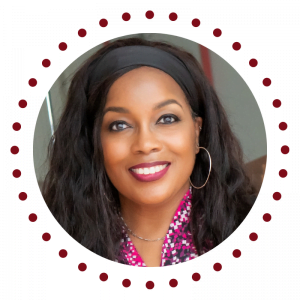
Want Karan to be Your Podcast Guest?
- Blended Workforces & the Gig Economy
- Critical Execution Tactics of High-performing Leaders
- Entrepreneurism & Leading Your Business

Want to be a Podcast Sponsor?
All sponsorships come with a featured spot on show notes pages.
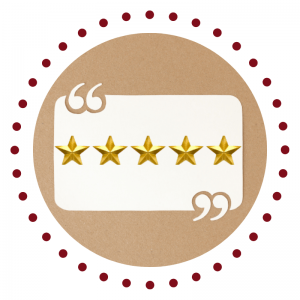
Like the Show? Please Leave a Review
If you like the show, it would mean the world to her if you left a quick review.
Your word is golden, so a HUGE thank you in advance!

#KeepInTouch
via our podcast alerts
Subscribe now to discover why thousands of monthly listeners who are passionate about doing their best work prioritize time each week to listen to the Blended Workforces @Work podcast.
#AboutSDL
#WhereToFindUs
MAILING
4480-H South Cobb Drive
PMB 219
Smyrna, GA 30080
PHYSICAL
2121 NewMarket Parkway
Ste. 108
Marietta, GA 30067
#ContactOptions
Customer Service Email:
service@shockinglydifferent.com
Call or Text:
770-384-1103
#Office Hours
MON-FRI
8:30 AM – 6:30 PM
Weekends By Appointment

